8b Unit 1 语法
牛津英语8B Unit 1词组
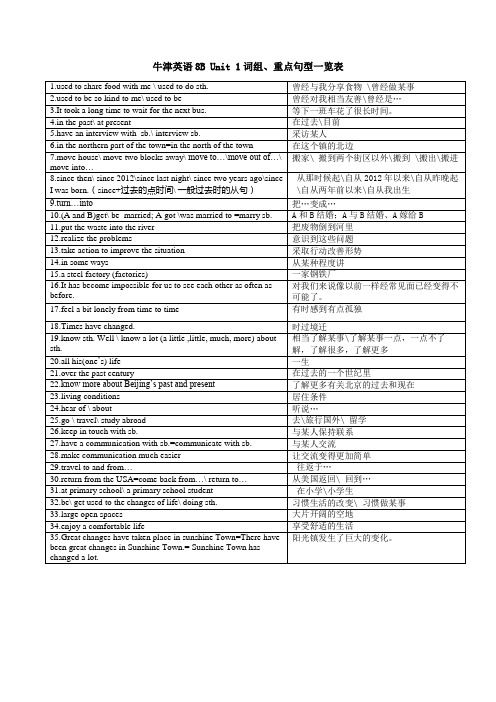
9.turn…into
把…变成…
10.(A and B)get\ be married; A got \was married to =marry sb.
A和B结婚;A与B结婚、A嫁给B
11.put the waste into the river
7.move house\ move two blocks away\ move to…\move out of…\ move into…
搬家\ 搬到两个街区以外\搬到\搬出\搬进
8.since then\ since 2012\since last night\ since two years ago\since I was born.(since+过去的点时间\一般过去时的从句)
等下一班车花了很长时间。
4.in the past\ at present
在过去\目前
5.have an interview withsb.\ interview sb.
采访某人
6.in the northern part of the town=in the north of the town
在这个镇的北边
对我们来说像以前一样经常见面已经变得不可能了。
17.feel a bit lonely from time to time
有时感到有点孤独
18.Times have changed.
时过境迁
19.know sth. Well\ know a lot (a little ,little, much, more) about sth.
28.make communication much easier
8b unit1 grammar

regular: v.+ed e.g chang— changed—changed clean—cleaned—cleaned liAAA ABB ABC
original cost read meet catch ride speak begin drink eat
THANK YOU
8B Unit1 Grammar
2010.4.19
Look and think
1.I have just eaten it .
2.You have changed too.
Present perfect tense
现在完成时
现在完成时的构成
助动词have/ has+p.p(过去 分词)
forms of p.p
动 词 填 空:
Have cleaned 1._____ you already________ (clean) the room?
have done Yes. we __________(do) that already. seen Has 2.______ he ______(see) this film yet? Yes. Have been 3. _____you ever ______(be) there many times?
二.表示从过去某一时刻开始并一直延 续到现在的动作或状态,但动作或状 态可能仍在继续。
She has lived here since she was born.
I have taught English for 26 years.
现在完成时的基本句型
①肯定形式。主语+ have/has+ 过去分词+其它e.g. I have done my homework She has gone to her school. ②否定形式。主语+ have/has+ not+过去分词+… (在助动词have/has后+not,可缩写为 haven’t/hasn’t)e.g. I haven’t done my homework. She hasn’t gone to her school.
译林版牛津英语8B语法点复习
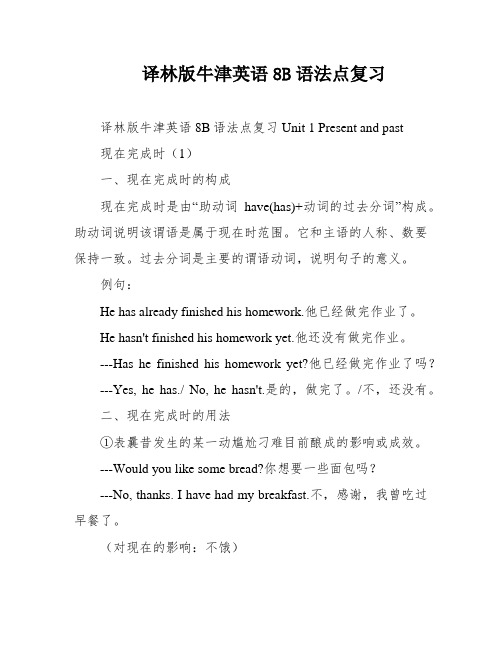
译林版牛津英语8B语法点复习译林版牛津英语8B语法点复习Unit 1 Present and past现在完成时(1)一、现在完成时的构成现在完成时是由“助动词have(has)+动词的过去分词”构成。
助动词说明该谓语是属于现在时范围。
它和主语的人称、数要保持一致。
过去分词是主要的谓语动词,说明句子的意义。
例句:He has already finished his homework.他已经做完作业了。
He hasn't finished his homework yet.他还没有做完作业。
---Has he finished his homework yet?他已经做完作业了吗?---Yes, he has./ No, he hasn't.是的,做完了。
/不,还没有。
二、现在完成时的用法①表曩昔发生的某一动尴尬刁难目前酿成的影响或成效。
---Would you like some bread?你想要一些面包吗?---No, thanks. I have had my breakfast.不,感谢,我曾吃过早餐了。
(对现在的影响:不饿)---Why don't you drive to your office?你为甚么不开车去办公室啊?---Because my car has broken.因为我的车坏了。
(对目前的影响:车没举措开了)①表示从过去开始一直持续到现在,也许还会继续下去的动作或状态。
He has studied English for 6 years.他已经研究英语六年了。
Mary has been busy since she came back from Hangzhou.自从从杭州回来,玛丽一直在忙。
3、常和目前完成时连用的工夫状语①用副词already和yet。
already一般用于一定句中,yet 一般用于否定句和疑问句中。
We have already finished our homework.我们已完成作业了。
8B Unit 1 Past and present知识清单
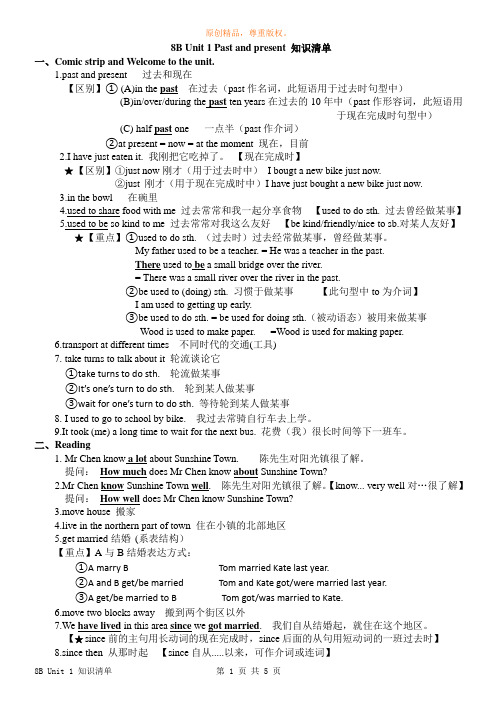
8B Unit 1 Past and present 知识清单一、Comic strip and Welcome to the unit.1.past and present 过去和现在【区别】① (A)in the past在过去(past作名词,此短语用于过去时句型中)(B)in/over/during the past ten years在过去的10年中(past作形容词,此短语用于现在完成时句型中)(C) half past one 一点半(past作介词)②at present = now = at the moment 现在,目前2.I have just eaten it. 我刚把它吃掉了。
【现在完成时】★【区别】①just now刚才(用于过去时中)I bougt a new bike just now.②just 刚才(用于现在完成时中)I have just bought a new bike just now.3.in the bowl 在碗里ed to share food with me 过去常常和我一起分享食物【used to do sth. 过去曾经做某事】ed to be so kind to me 过去常常对我这么友好【be kind/friendly/nice to sb.对某人友好】★【重点】①used to do sth. (过去时)过去经常做某事,曾经做某事。
My father used to be a teacher. = He was a teacher in the past.There used to be a small bridge over the river.= There was a small river over the river in the past.②be used to (doing) sth. 习惯于做某事【此句型中to为介词】I am used to getting up early.③be used to do sth. = be used for doing sth.(被动语态)被用来做某事Wood is used to make paper. =Wood is used for making paper.6.transport at different times 不同时代的交通(工具)7. take turns to talk about it 轮流谈论它①take turns to do sth. 轮流做某事②It’s one’s turn to do sth. 轮到某人做某事③wait for one’s turn to do sth. 等待轮到某人做某事8. I used to go to school by bike. 我过去常骑自行车去上学。
8BUnit 1 past and present短语

8B Unit1 词组1. not…any more = no more // not …any longer = no longer 不再,再也不……2. in the past 在过去3. in /during/over the past few years 在过去的几年时间里4. at present 在现在5. in the centre of town = in the town centre 在镇中心6. It’s pleasant to do sth 干某事很高兴7. do a history project on the changes 做一个有关于变迁的历史课题8. the changes to/in Sunshine Town 阳光镇的变化9. transport at different times 不同时代的交通工具10. interview sb to get some information. 采访某人以获取一些信息11. ask sb for help 向某人求助12. move house 搬家13. since then 从那时起14. move to another flat in the centre of the town with my family和我家人搬到镇中心的另一所公寓15. be // get married to sb= marry sb 和某人结婚16. be// get married 结婚17. for example 例如18. live in the southern part of town together till 1965 一起在镇的南部住到1965年19. as often as before 像以前一样经常/频繁20. market stalls 零售货摊21. turn/change the place into a post office 把这地方变成邮电局22. play cards and Chinese chess at weekends 在周末打牌下中国象棋23. reduce water pollution 减少水污染24. a shoe factory\ shoe factories 一家鞋厂/鞋厂25. used to dump its waste into the river 过去经常把它的废水倒入河里26. the poison in the waste polluted the river 废弃物里的毒药污染河流27. The government realized it was a very serious problem政府意识到它是一个非常严重的问题28. take action to protect the environment 采取措施保护环境29. in some ways 在某些方面30. have open space and pretty gardens 拥有开放的空间和漂亮的花园31. become more difficult to see some of my old friends 看望我的老朋友变得更困难32. feel a bit /a little lonely from time to time 不时地感到有点孤独33. move next to the park 搬到公园隔壁34. move out of //into --- 搬出……// 搬进---35. throw away something// throw it away 扔走某东西36. hear from sb. = get/receive a letter from sb. 收到某人的来信37. have an interview with sb /interview sb 对某人进行一次采访38. tell me a lot about his past and present 告诉我很多有关他过去和现在的事39. the history of the town 小镇的历史40. miss his old friends 想念他的老朋友41. be lucky enough to do sth 足够幸运地干某事42. hear about the future plan 听说这未来计划43. enjoy the exhibition 喜欢展览44. in fact 实际上45. a place of natural beauty 一个自然美的地方46. borrow sth from sb 向某人借某物lend sth to sb 把某物借给某人47. be in service = be in use 被使用48. in primary school 在小学里49. on one's own /alone/ by oneself 独自50. have time to relax more 有时间去更多的放松51. have more free time 有更多的空闲时间52. have the same feeling as you 和你有同样的感受53. stay after school to chat with friends 放学后留下来和朋友聊天54. many buses pass the town 许多公共汽车经过镇55. bring many advantages 带来许多好处(优势)56. bring them a modern life 给他们带来一种现代化的生活57. the title of your report …你报告的题目58. get lost = be lost = lose one's way 迷路59. become a new tourist attraction 成为一个新的旅游景点60. next to the clock tower 在钟楼的旁边61. a few/ several times 几次62. repair over ten bicycles 修了十多辆自行车63. at the history museum 在历史博物馆64. decide to do sth / make up one’s mind to do sth 决定做某事65. travel by plane 乘飞机旅行66. look up the word in the dictionary 在字典里查单词67. cause many problems for people 给人们产生许多的问题68. by the way 顺便问一下69. own a boat 拥有一艘船70. show sb how to do sth. 示范给某人看如何做某事71. the best model I have ever seen 我曾经所见过的最好的模型72.fresh air 新鲜空气73. lose my map 丢了我的地图74. a recent report / photo 最近的报道/照片。
牛津译林英语8B Unit1--Unit8单词短语知识点(默写版)
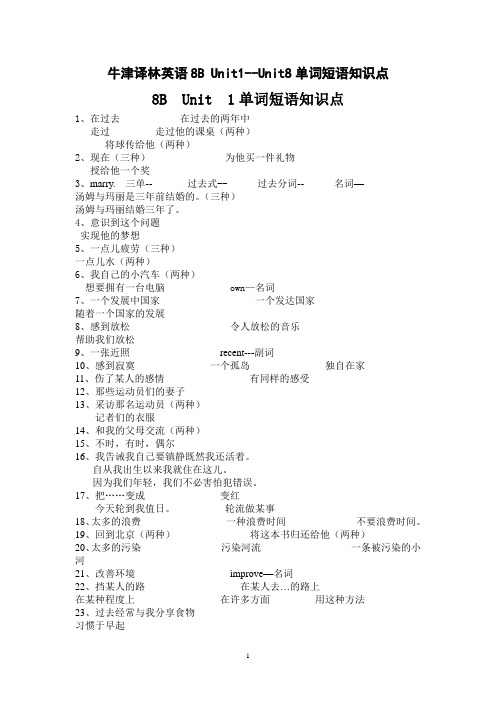
牛津译林英语8B Unit1--Unit8单词短语知识点8B Unit 1单词短语知识点1、在过去在过去的两年中走过走过他的课桌(两种)将球传给他(两种)2、现在(三种)为他买一件礼物授给他一个奖3、marry. 三单-- 过去式-- 过去分词-- 名词—汤姆与玛丽是三年前结婚的。
(三种)汤姆与玛丽结婚三年了。
4、意识到这个问题实现他的梦想5、一点儿疲劳(三种)一点儿水(两种)6、我自己的小汽车(两种)想要拥有一台电脑 own—名词7、一个发展中国家一个发达国家随着一个国家的发展8、感到放松令人放松的音乐帮助我们放松9、一张近照recent---副词10、感到寂寞一个孤岛独自在家11、伤了某人的感情有同样的感受12、那些运动员们的妻子13、采访那名运动员(两种)记者们的衣服14、和我的父母交流(两种)15、不时,有时,偶尔16、我告诫我自己要镇静既然我还活着。
自从我出生以来我就住在这儿。
因为我们年轻,我们不必害怕犯错误。
17、把……变成变红今天轮到我值日。
轮流做某事18、太多的浪费一种浪费时间不要浪费时间。
19、回到北京(两种)将这本书归还给他(两种)20、太多的污染污染河流一条被污染的小河21、改善环境improve—名词22、挡某人的路在某人去…的路上在某种程度上在许多方面用这种方法23、过去经常与我分享食物习惯于早起习惯于艰苦的工作被用来寄信24、我常常骑一辆红色的自行车上学。
(两种)步行去某地(两种)25、太多的人太多的食物电视看得太多实在太快26、在镇北边(两种)27、这些年期间在过去的世纪期间从椅子上跳过去河上有一座桥。
全世界二十多名学生28、我的老朋友中的大多数人他们中的许多人29、打牌下象棋30、对阳光镇知之甚少31、在路的两边32、我已经完成了我的家庭作业。
我还没有完我的家庭作业。
你完成了你的家庭作业了吗?33、丽丽曾经看过这部电影吗?以前我从来没有去过北京。
34、刚才我看电视的。
8b Unit 1 grammar
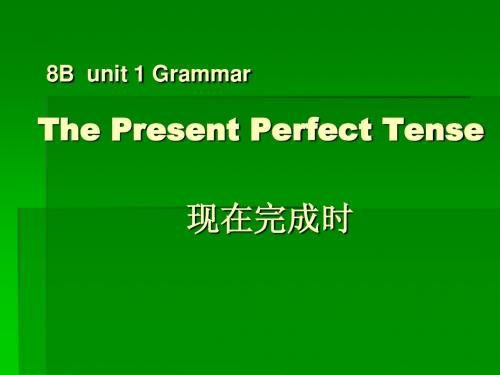
Have you……? 疑问 Has he……?
按要求进行句型转换
1. He has already finished his homework.(一 般问句,并作肯定、否定回答) Has he finished his homework yet ? Yes, he has. No, he hasn’t. /Not yet. 2. I have never been to Beijing before.(一般 问句) Have you ever been to Beijing before? 3. They have learned around five units.(提问)
kept
borrow
have/has kept
The film has begun for 10 minutes.
been on
begin
have/has been on
The concert has finished for half an hour.
been over
finish
have/has been over
有些动词不能和for, since, how long 等连用
• He has bought the book. • He has bought the book for a week. • He has had the book for a week.
She has bought the computer for two years.
15. ______ you _______ (read) today’s newspaper yet? 16. They _____already_____(do) their homework. But they don’t know what_____ (do) next. 17. ---____ you _____ (see) the film last night? ---No, I ___________ (see) it for several times. 18. She ____________ (be) ill for three days. 19. My father ___________ ( buy) a book for me yesterday. He____ already _________(pay) fifty yuan for it. 20. She____________ (not read) this book before. 21. ____ you ever __________ (travel) on a train before? 22. --- ____ Wei Hua _____ (come) yet? ---Yes. She_______ (come) already. She ______ (come) just now. 23. ---How long _____you __________(learn) English? ---For more than two years.
8B Unit 1 grammar
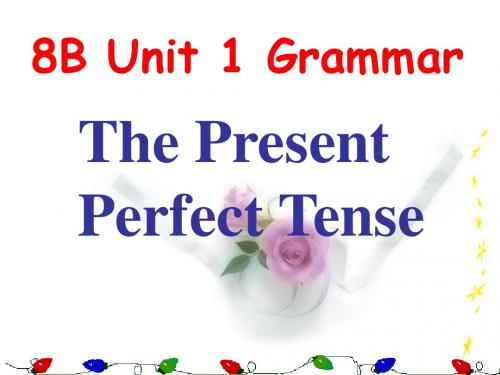
Key words
yet for
ever
never since
have A: How long ______ taught you ________ in this school? (teach ) B: For 6 years.
Key words
yet for just
ever
never since
ever
never since so far
already
up to now in his life
in the past 10 years lately recently
(ever) since then
has lived He ___________ in this city ever since then. (live )
up to now in his life
in the past 10 years
has done He __________ a lot of good things in his life. (do )
Key words
yet for just before
ever
never since so far
比较下列时态
名称 时间
1.v原形 原形
动词形式
2.v+s/es am/is/are+v-ing 1.will/shall+v原形 原形 2.am/is/are going to +v原形 原形 1.v-ed(规则动词) (规则动词) 2.不规则动词 不规则动词 was/were+v-ing
平时, 一般现在时 平时,经常 现在进行时 正在进行
3.He _________basketball at 4:00 p.m. yesterday. was playing
8B Unit1 知识点归纳
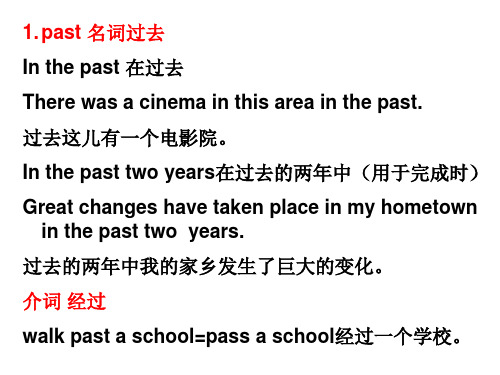
7. northern adj. 北方的,北部的 in the north of=in the northern part of He lives in the north of this city.=He lives in the northern part of this city.他住在这个城市的北部。 south-southern east-eastern west-western Beijing is a northern city of China. 8. marry v. 结婚 (have a wife or a husband) marry sb. She married a football player. . marry sb to sb把某人嫁给某人,e.g. He married his daughter to an actor.
The knife is used for cutting apples. be/become/get used to sth习惯于某事, be/become/get used to doing sth习惯于做某事
Tom is used to getting up early. Tom习惯于早起。
The old man isn’t used to the city life. 这个老人不习惯城市生活。
I usedn’t to swim in this river./ I didn’t use to swim in this river. 否定句
疑问式Did sb use to do sth?或Used sb to do sth?
牛津英语八年级下册8B知识点
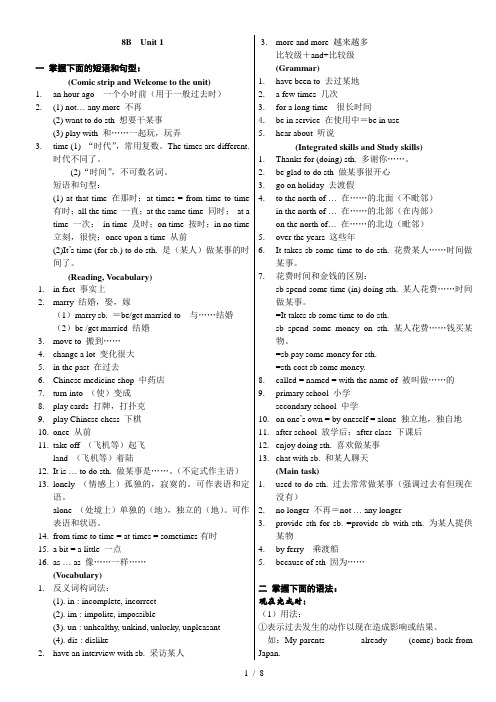
8B Unit 1一掌握下面的短语和句型:(Comic strip and Welcome to the unit)1.an hour ago 一个小时前(用于一般过去时)2.(1) not… any more 不再(2) want to do sth 想要干某事(3) play with 和……一起玩,玩弄3.time (1) “时代”,常用复数。
The times are different.时代不同了。
(2)“时间”,不可数名词。
短语和句型:(1) at that time 在那时;at times = from time to time有时;all the time 一直;at the same time 同时;at a time 一次;in time 及时;on time 按时;in no time 立刻,很快;once upon a time 从前(2)It’s time (for sb.) to do sth. 是(某人)做某事的时间了。
(Reading, Vocabulary)1.in fact 事实上2.marry 结婚,娶,嫁(1)marry sb. =be/get married to与……结婚(2)be /get married 结婚3.move to 搬到……4.change a lot 变化很大5.in the past 在过去6.Chinese medicine shop 中药店7.turn into (使)变成8.play cards 打牌,打扑克9.play Chinese chess 下棋10.once 从前11.take off (飞机等)起飞land (飞机等)着陆12.It is … to do sth. 做某事是……。
(不定式作主语)13.lonely (情感上)孤独的,寂寞的。
可作表语和定语。
alone (处境上)单独的(地),独立的(地)。
可作表语和状语。
牛津译林版英语八下_Units 1-3 现在完成时语法讲解和练习
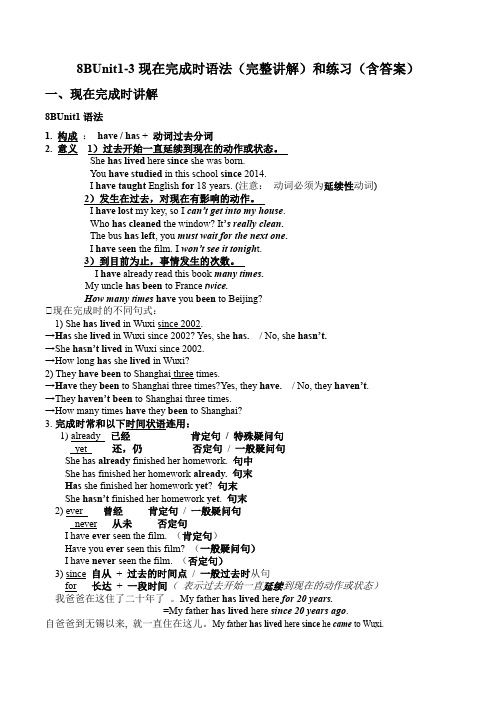
8BUnit1-3现在完成时语法(完整讲解)和练习(含答案)一、现在完成时讲解8BUnit1语法1. 构成:have / has + 动词过去分词2. 意义1)过去开始一直延续到现在的动作或状态。
She has lived here since she was born.You have studied in this school since 2014.I have taught English for 18 years. (注意:动词必须为延续性动词)2)发生在过去,对现在有影响的动作。
I have lost my key, so I can’t get into my house.Who has cleaned the window? It’s really clean.The bus has left, you must wait for the next one.I have seen the film. I won’t see it tonigh t.3)到目前为止,事情发生的次数。
I have already read this book many times.My uncle has been to France twice.How many times have you been to Beijing?★现在完成时的不同句式:1) She has lived in Wuxi since 2002.→Has she lived in Wuxi since 2002? Yes, she has./ No, she hasn’t.→She hasn’t lived in Wuxi since 2002.→How long has she lived in Wuxi?2) They have been to Shanghai three times.→Have they been to Shanghai three times?Yes, they have./ No, they haven’t.→They haven’t been to Shanghai three times.→How many times have they been to Shanghai?3.完成时常和以下时间状语连用:1)already 已经肯定句/ 特殊疑问句yet 还,仍否定句/ 一般疑问句She has already finished her homework. 句中She has finished her homework already.句末Has she finished her homework yet? 句末She hasn’t finished her homework yet. 句末2) ever 曾经肯定句/ 一般疑问句never 从未否定句I have ever seen the film. (肯定句)Have you ever seen this film? (一般疑问句)I have never seen the film. (否定句)3) since 自从+ 过去的时间点/ 一般过去时从句for 长达+ 一段时间(表示过去开始一直延续到现在的动作或状态)我爸爸在这住了二十年了。
8B Unit 1Grammar牛津译林英语
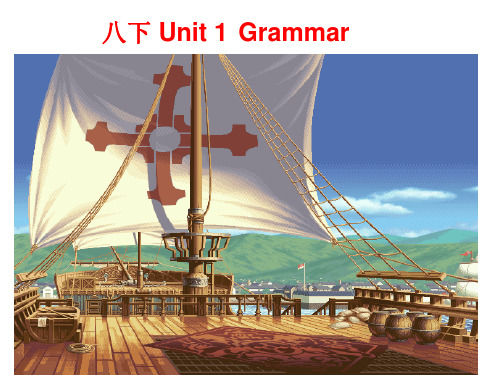
5:对我们来说,像以前那样常见到彼此已变得不可能。
Do you remember Mr Chen?
1.
How long has he lived in Sunshine Town?
He has lived in Sunshine Town since he was born.
2.
Has he ever moved house?
改错:
1.The students have has cleaned the classroom. The classroom is clean now. 2.Mum has cooked cook supper. Supper is ready now. 3.I have see seen the new film. It is interesting. 4.His family have lived lived here since 2000. 5. I have try tried on the hat. It doesn’t suit me.
看P13说出下列动词的过去式和过去分词:
visit visited repair repaired watch watched finish finished
move live love like
visited repaired watched finished
verb+ed
moved lived loved liked
P14 B1. 2. 3.Fra bibliotek4. 5.
6.
have finished They _______________(finish) their homework yeaterday. has visited John ________never_________(visit) China. has repaired Mr Li _____________(repair) over ten bicycles since Monday. seen We haven`t _____________(not see) each other for years. come My parents haven`t _____________(not come) back yet. has taught Our teacher_____________(teach) us a lot about the history of China.
(原创)8B Unit 1词组
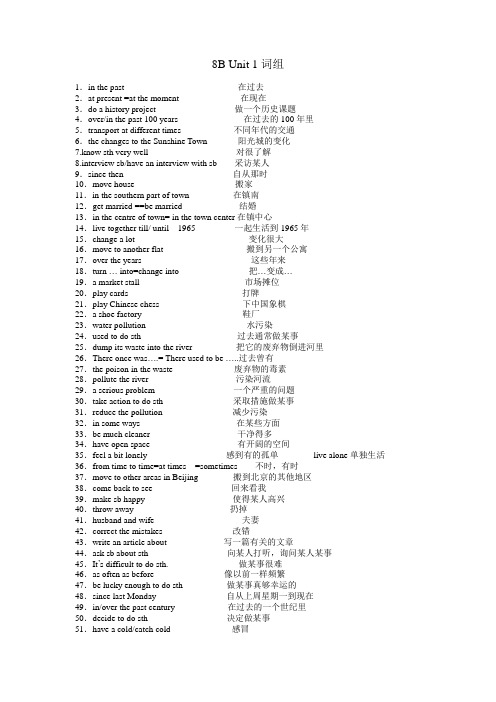
8B Unit 1词组1.in the past 在过去2.at present =at the moment 在现在3.do a history project 做一个历史课题4.over/in the past 100 years 在过去的100年里5.transport at different times 不同年代的交通6.the changes to the Sunshine Town 阳光城的变化7.know sth very well 对很了解8.interview sb/have an interview with sb 采访某人9.since then 自从那时10.move house 搬家11.in the southern part of town 在镇南12.get married ==be married 结婚13.in the centre of town= in the town center在镇中心14.live together till/ until 1965 一起生活到1965年15.change a lot 变化很大16.move to another flat 搬到另一个公寓17.over the years 这些年来18.turn … into=change into 把…变成…19.a market stall 市场摊位20.play cards 打牌21.play Chinese chess 下中国象棋22.a shoe factory 鞋厂23.water pollution 水污染24.used to do sth过去通常做某事25.dump its waste into the river把它的废弃物倒进河里26.There once was….= There used to be …..过去曾有27.the poison in the waste废弃物的毒素28.pollute the river污染河流29.a serious problem一个严重的问题30.take action to do sth采取措施做某事31.reduce the pollution减少污染32.in some ways在某些方面33.be much cleaner干净得多34.have open space有开阔的空间35.feel a bit lonely感到有的孤单live alone单独生活36.from time to time=at times=sometimes不时,有时37.move to other areas in Beijing搬到北京的其他地区38.come back to see回来看我39.make sb happy使得某人高兴40.throw away扔掉41.husband and wife夫妻42.correct the mistakes改错43.write an article about 写一篇有关的文章44.ask sb about sth向某人打听,询问某人某事45.It’s difficult to do sth.做某事很难46.as often as before像以前一样频繁47.be lucky enough to do sth做某事真够幸运的48.since last Monday自从上周星期一到现在49.in/over the past century在过去的一个世纪里50.decide to do sth决定做某事51.have a cold/catch cold感冒52.hear from sb/ get (receive)a letter from sb收到某人的来信53.stay there for a whole week呆在那儿整整一个星期54.enjoy the sun and the beach享受阳光和沙滩55.look like the real one看起来象真的56.by the way顺便问57.in fact事实上58.fly to Sanya = go to Sanya by plane坐飞机去三亚walk to school = go to school on foot 步行上学ride a bike to school = go to school by bike 骑车上学take a bus to school = go to school by bus 乘车上学59.the best model I have ever seen 我见过的最好的模型60.a place of natural beauty 一个自然美的地方61.lend sb sth/lend sth to sb 把某物借给某人62.natural and beautiful 自然美丽63.be in use/service 投入使用64.take me to school 带我去上学65.be in primary school 上小学66.on one’s own =by oneself 靠自己,独自67.have time to relax 有时间放松68.have the same feeling 有同感69.green hills around 青山怀抱70.fresh air 新鲜的空气71.go to town by bicycle or on foot 骑车或步行去城72.less development 发展不快73.the railway station 火车站74.bring people many advantages 给人们带来许多便利75.cause many problems 导致许多问题76.take photos 拍照77.a recent photo 一幅最近的照片78.live a modern life 过着现代化的生活79.next to the clock tower 在钟楼旁边80.no more=not any more 不再81.a tourist attractions 旅游景点82.show you how to do sth 示范某人如何做83.something useless 一些没有用途的东西84.realize one’s dream 实现梦想85.the title of the report 报告的标题86.an art exhibition 一次艺术展87.the opposite of…....的反义词。
牛津深圳版八年级下册 unit 1语法 讲解+练习 (答案不全)
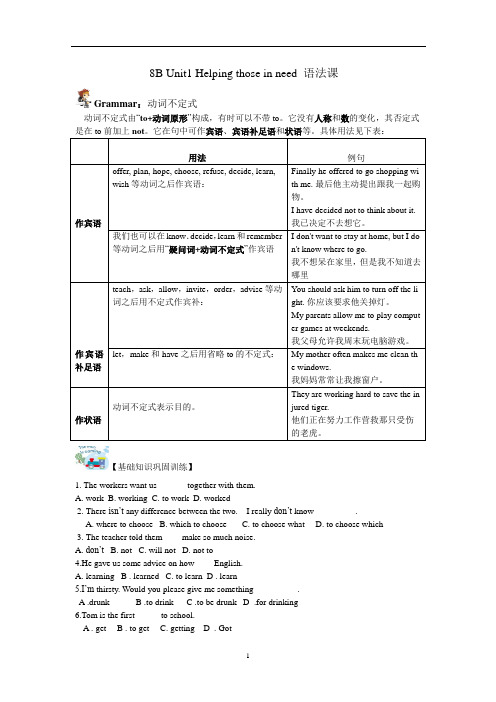
8B Unit1 Helping those in need 语法课Grammar:动词不定式动词不定式由“to+动词原形”构成,有时可以不带to。
它没有人称和数的变化,其否定式是在to前加上not。
它在句中可作宾语、宾语补足语和状语等。
具体用法见下表:用法例句作宾语offer, plan, hope, choose, refuse, decide, learn,wish等动词之后作宾语:Finally he offered to go shopping with me. 最后他主动提出跟我一起购物。
I have decided not to think about it.我已决定不去想它。
我们也可以在know.decide,learn和remember等动词之后用“疑问词+动词不定式”作宾语I don't want to stay at home, but I don't know where to go.我不想呆在家里,但是我不知道去哪里作宾语补足语teach,ask,allow,invite,order,advise等动词之后用不定式作宾补:You should ask him to turn off the light. 你应该要求他关掉灯。
My parents allow me to play computer games at weekends.我父母允许我周末玩电脑游戏。
let,make和have之后用省略to的不定式:My mother often makes me clean the windows.我妈妈常常让我擦窗户。
作状语动词不定式表示目的。
They are working hard to save the injured tiger.他们正在努力工作营救那只受伤的老虎。
【基础知识巩固训练】1. The workers want us ______ together with them.A. workB. workingC. to workD. worked2. There isn’t any difference between the two. I really don’t know _________.A. where to chooseB. which to chooseC. to choose whatD. to choose which3. The teacher told them ____make so much noise.A. don’tB. notC. will notD. not to4.He gave us some advice on how____ English.A. learning B . learned C. to learn D . learn5.I’m thirsty. Would you please give me something ________.A .drunkB .to drinkC .to be drunkD .for drinking6.Tom is the first _____ to school.A . getB . to get C. getting D . Got7. The boy wanted to ride his bicycle in the street, but his mother told him ______.A. not toB. not to doC. not do itD. do not to8. I saw him _______ out of the room. A. go B. had gone C. has gone D. goes9.---_______ more about tomorrow’s weather, call 121. ---OK, I will. Thank you.A. KnowB. KnowingC. To knowD. Known10.We must do everything we can ____ waste water from running into rivers.A. keepB. keptC. to keepD. keeping11.Let’s ____ play in the street. Father tells me __ do so.A. not to;not toB. not;not toC. don’t;to notD. not to;don’t12.When I came into the room, he pretended ____ his homework.A. to doB. be doingC. doingD. to be doingCBDC BBAA CCBA二.用括号中动词的适当形式填空。
新译林8B-unit1-past-and-present知识总结
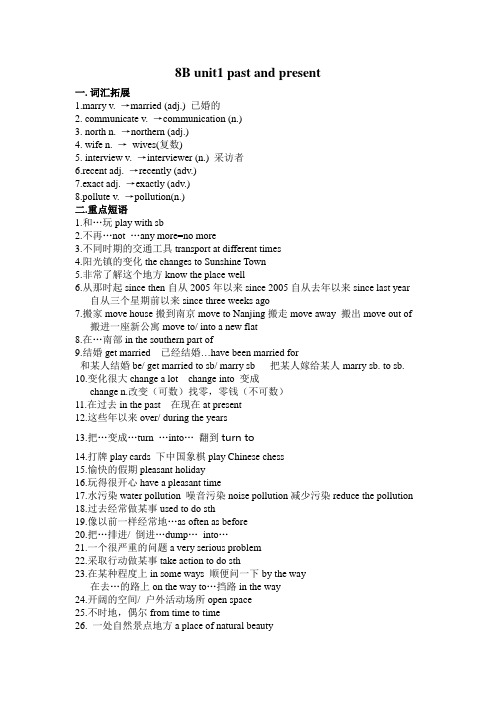
8B unit1 past and present一.词汇拓展1.marry v. →married (adj.) 已婚的2. communicate v. →communication (n.)3. north n. →northern (adj.)4. wife n. →wives(复数)5. interview v. →interviewer (n.) 采访者6.recent adj. →recently (adv.)7.exact adj. →exactly (adv.)8.pollute v. →pollution(n.)二.重点短语1.和…玩play with sb2.不再…not …any more=no more3.不同时期的交通工具transport at different times4.阳光镇的变化the changes to Sunshine Town5.非常了解这个地方know the place well6.从那时起since then自从2005年以来since 2005自从去年以来since last year自从三个星期前以来since three weeks ago7.搬家move house搬到南京move to Nanjing搬走move away 搬出move out of搬进一座新公寓move to/ into a new flat8.在…南部in the southern part of9.结婚get married 已经结婚…have been married for和某人结婚be/ get married to sb/ marry sb 把某人嫁给某人marry sb. to sb.10.变化很大change a lot change into 变成change n.改变(可数)找零,零钱(不可数)11.在过去in the past 在现在at present12.这些年以来over/ during the years13.把…变成…turn …into…翻到turn to14.打牌play cards 下中国象棋play Chinese chess15.愉快的假期pleasant holiday16.玩得很开心have a pleasant time17.水污染water pollution 噪音污染noise pollution减少污染reduce the pollution18.过去经常做某事used to do sth19.像以前一样经常地…as often as before20.把…排进/ 倒进…dump…into…21.一个很严重的问题a very serious problem22.采取行动做某事take action to do sth23.在某种程度上in some ways 顺便问一下by the way在去…的路上on the way to…挡路in the way24.开阔的空间/ 户外活动场所open space25.不时地,偶尔from time to time26. 一处自然景点地方a place of natural beauty27.从…借…borrow sth from sb借给某人…/把…借给…lend sb sth= lend sth to sb28.在使用中be in use= be in service29.带…去…take sb to …30.独自地on one’s own= by oneself= alone31.有同感have the same feeling32.青山环绕green hills around33.清新的空气fresh air34.良好的环境a good environment35.发展缓慢less development36.离…远be far (away) from 两个街区远two blocks away 离…近be close to…37.给…造成许多麻烦cause many problems for…38.近期照片recent photos 在近几年中in recent years39. …的反义词the opposite of…40. 有好运have good luck41.把…扔掉throw sth away42.写一篇有关阳光镇的文章write an article on Sunshine Town43.在过去的一个世纪over the past century44.关于北京的过去和现在about Beijing’s past and present45.感冒have a cold 患重感冒have a bad cold46.受到某人的来信hear from sb= receive a letter from47.乘飞机旅行travel by plane/ by air48.享受阳光和沙滩enjoy the sun and the beach49.走遍城市go around the city50.返回return =get back return to 回到,归还51.出国go abroad 国内外at home and abroad52.和…保持联系keep in touch with三.重点句子1. ----Eddie,have you seen my food ? ----Yes. I’ve just eaten it.“埃迪,你看到我的食物了吗?”“是的,我刚刚把它吃完。
8B Unit 1 Grammar 1 动词不定式做宾语和宾补
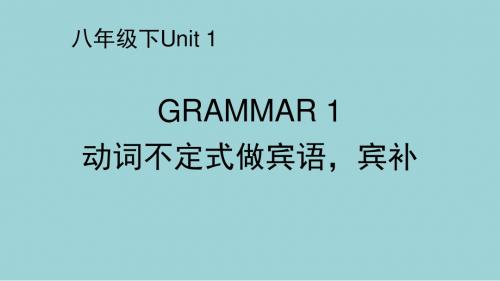
习题链接
D 1.So much work usually makes them ______ very tired. A. to feel B. feels C. feeling D. feel C 2.Look, can you see the boy ______. A. to play tennis B. play tennis C. playing tennis D. plays tennis
作宾语补足语不带to 的情况:
Let me do it. I saw him cross the street.
常见动词有:使役动词: let, make, have 感官动词: see, watch, hear, feel, listen to 注意:感官动词即可接to do,又可接doing,不 定式表示动作的全过程(动作已结束),用动词 的-ing形式表示动作正在进行(动作尚未结束)。
• begin to do • try to do • start to do • go on/continue to do • like to do • stop to do • love to do
• hate to do
• forget to do
• remember to do
习题链接
C some vegetables. 1. He wants ______ A. buy B. buying C. to buy D. buys 2. Don't forget ______ your homework with A you when you come to school. A. to bring B. bringing C. to take D. taking
8Bunit1短语总结
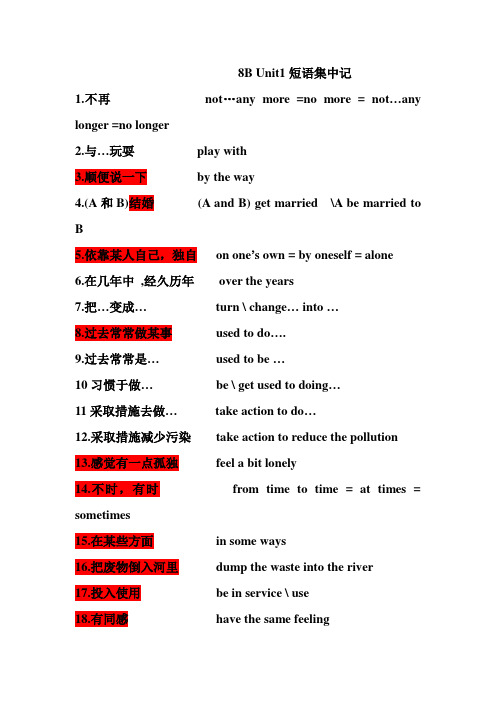
8B Unit1短语集中记1.不再not…any more =no more = not…any longer =no longer2.与…玩耍play with3.顺便说一下by the way4.(A和B)结婚(A and B) get married \A be married to B5.依靠某人自己,独自on one’s own = by oneself = alone6.在几年中,经久历年over the years7.把…变成…turn \ change… into …8.过去常常做某事used to do….9.过去常常是…used to be …10习惯于做…be \ get used to doing…11采取措施去做…take action to do…12.采取措施减少污染take action to reduce the pollution13.感觉有一点孤独feel a bit lonely14.不时,有时from time to time = at times = sometimes15.在某些方面in some ways16.把废物倒入河里dump the waste into the river17.投入使用be in service \ use18.有同感have the same feeling19.在…的北\ 南部in the northern \ southern part of …20.改变很多,变化大change a lot21.有时间多放松have time to relax more22.在镇中心in the centre of town23.直到1965年till 196524.在不同时代at different times25.对….很了解know…very well26.搬到另一所公寓move to another flat27.搬进新公寓move into a new flat28.搬出…. move out of…29.事实上in fact30.在过去in the past31.带来许多好处bring many advantages32.引起许多麻烦,导致许多问题cause many problems33.给某人带来现代化的生活bring sb. a modern life34.像以前一样好as good as before35.打牌,下中国象棋play cards and Chinese chess36.喜欢和…聊天enjoy chatting with…37.水污染water pollution38.污染河流pollute the river39.意识到它是个严重的问题realize it is a very serious problem40.拥有.宽阔的空间have open space41.让某人开心make sb. happy42.干净的多much cleaner43.收到某人的来信hear from sb. = receive a letter from sb.44.拥有一条船own a boat45.带某人去学校take sb. to school46.在小学in primary school47.更多的一些人 a lot more people48.一些没用的东西something useless49.离…远be far from50.扔掉throw away51.采访某人have an interview with sb.52.在入口处at the entrance53.写一篇关于…的文章write an article on…54.决定做…. decide to do …55.一个自然美的地方 a place of natural beauty56.清新的空气fresh air。
牛津英语8Bunit1知识点

(牛津初中英语总复习) 8B Unit 1一.精选词汇㈠重点短语1. the changes to Sunshine Town阳光镇的变化→the changes to……的变化 (p8)〈知识链接〉change n.变化,常用复数changes。
e.g. Great changes have taken place since 1995.2. in the southern part of town →in the southern part of…在…的南部→south →southern 〈知识链接〉east东部→eastern东部的, west →western, north →northern3. in the past在过去→at present现在→in the future未来;将来,注意这些短语中的介词和冠词。
4. turn the place into a park →turn…into…把…变成…〈知识链接〉①Heat turns water into vapor.热使水变成蒸气。
②Turn this sentence into English.5. play cards and Chinese chess打牌、下象棋,e.g. It’s pleasant to play cards and Chinese chess.6. water pollution水污染→air pollution空气污染,noise pollution噪音污染 (p9)〈知识链接〉Water pollution was a problem before.7. used to dump its waste into water →used to do sth过去常做某事,注意否定式、疑问式的形式〈知识链接〉⑴used to do sth →否定式used not to do sth或didn’t use to do sth→疑问式Did sb use to do sth?或Used sb to do sth? ⑵There be和used to合用的形式为There used to be。
译林版八年级下册英语 8B Unit 1-Unit 8词组句型汇总

8B Unit1词组句型Comic&Welcome to the unit(P6)1.过去常常做某事used to do sth2.对某人友善be kind to sb(P7)3.在不同时期at different times4.不同形式的交通工具different forms of transport5.轮流做某事take turns to do sth.6.等下一班需要很长时间。
It took a long time to wait for the next one.Reading(P8)1.采访某人(两种表达)interview sb.=have an interview with sb.2.非常了解…know…very well3.自从我出生起since I was born4.搬家move house5.在城北in the northern part of town6.结婚get married7.搬离两个街区move two blocks away8.自从那时起since then9.变化很大change a lot10.在那些年里over the years11.在小镇中心in the town centre12.把…变成…turn into13.小镇的部分地区part of the town(P9)14.一家钢铁厂a steel factory15.把垃圾倒入河道put the waste into the river16.认识到这个问题realize the problem17.改善形势improve the situation18.从某种意义上说in some ways19.和以前一样经常看到彼此see each other as often as before20.下象棋play Chinese chess21.感到有点孤单feel a bit lonely22.有时,不时from time to time(P11)23.他的一生all his life24.阳光镇的变化the changes in Sunshine TownGrammar(P14)1.在过去的那个世纪over the past/last century2.北京的过去和现在Beijing’s past and presentIntegrated skills+Study skills(P15)1.做一个关于…的历史课题do the history project on sth2.生活条件living conditions3.火车站railway station(P16)4.进城出城travel to and from the town5.另一个大的变化是…Another big change is…6.当地人local people7.从美国回来return from the USA8.你们上一次看到对方是什么时候?When did you last see each other?9.出国go abroad10.在读小学be at primary school11.保持联系keep in touch with each other12.通过电子邮件交流communicate by email13.使得交流容易得多make communication much easier(P17)14.一条河穿过镇中心A river runs through the centre of town.15.习惯于做某事get/be used to doing sth16.(某人)独自on one’s own17.生活的变化changes in/of(one’s)lifeTask(P19)1.在过去的几年里月光镇发生了很多变化。
苏教版英语8B-unit1-past-and-present知识点梳理

8B unit1 past and present标题分析: Past and present(1)past做名词,表示“过去,往昔”in the past在过去,以前=years agoPast 做形容词,表示”过去的“,in the past few years在过去的几年中间Past 做副词,表示”经过,过去“,walk past the house, drive past the post office走过...;驶过... Past 做介词,表示”超出,在...以后“,ten past seven, 7点10分辨析: past/passpast 做介词,跟动词连用,如run past, walk past, hurry past, drive past...不可以独自使用表示经过Pass 做动词,直接跟宾语,如pass the house, pass the supermarket;其他,pass当动词表示“递给”pass me the salt例题:When I walked the playground, I saw a lot of boys there.A.Past; play footballB.Passed; playing footballC.Past; playing footballD.Passed; play football(2)Present做名词,表示“此刻” ,at present此刻=nowPresent做名词,表示“礼品” , buy sb. a present=buy a present for sb.Present做形容词,表示“此刻的,当前的”,the present condition当前的状态the present day今世的例题:汉译英他们常常讨论过去,此刻和未来。
请接见我们的网站,来购置特其他礼品。
一 . 词汇拓展v. →married (adj.)已婚的municate v. → communication (n.)3.north n.→ northern (adj.)4. wife n.→ wives(复数)5. interview v.→interviewer (n.)采者adj. → recently (adv.)adj. → exactly (adv.)v.→pollution(n.)二. 要点短1.和某人分享某物2.某人好3.不一样期的交通工具4.阳光的化5.特别认识个地方不太认识那个地方6.从那起自从 2005 年以来自从昨年以来自从三个礼拜前以来7.迁居搬到南京搬走搬出搬一座新公寓搬到两个街区之外8.在⋯南部9.婚10.化很大成change n. 改(可数)找零,零(不行数)11.在去在在12.些年以来13.把⋯成翻到14.打牌下中国象棋15.快捷16.花做某事17. 水染噪音染减少染18.去常做某事19.像以前一常地20.把⋯扔21.一个很重的22.采纳行做某事23. 在某种程度上便一下在去⋯的路上路24.开的空 / 外活所25.不地,偶26.一自然景点地方27. 从⋯借⋯借某人⋯/把⋯借⋯28.在使用中29.⋯去⋯30.独自地31.居住境32.清爽的空气33.和他的父亲母亲一同出国37.保持系38. 近期照片 recent在近几年中39.通 email 沟通40.使沟通41.在中心三 . 要点句子, have you seen my food ----Yes. I’ ve just eaten it.Just表示“ ”,表示生的事情,用于在达成。
- 1、下载文档前请自行甄别文档内容的完整性,平台不提供额外的编辑、内容补充、找答案等附加服务。
- 2、"仅部分预览"的文档,不可在线预览部分如存在完整性等问题,可反馈申请退款(可完整预览的文档不适用该条件!)。
- 3、如文档侵犯您的权益,请联系客服反馈,我们会尽快为您处理(人工客服工作时间:9:00-18:30)。
Grammar动词不定式是一种非谓语动词,可以在句子中作主语、宾语、定语、状语和宾语补足语等。
动词不定式的基本形式是“to+动词原形”,但to有时可以省略。
本单元的Grammar板块主要讲解其充当宾语、宾语补足语和目的状语的用法。
1 动词不定式作宾语动词不定式作宾语的基本结构是:动词+动词不定式。
下面这些动词后可以跟动词不定式作宾语:What do you want to do this evening? 你今晚想做什么?It's not very late.We don't need to go home now.时间还不算晚,我们现在还不必回家。
Tina has decided to sell her car.蒂娜已决定把车卖了。
You forgot to switch off the light when you went out.你出门的时候忘记关灯了。
My younger brother is learning to drive.我弟弟正在学开车。
I tried to read my book but I was too tired.我努力想看书,但我太累了。
动词不定式的部分也可以使用否定形式。
如:Millie decided not to go out.米利决定不出门。
但是并非所有的动词都可以这样用。
如:(×) Kitty plans not to take Linda out.(√) Kitty doesn't plan to take Linda out.Kitty不打算带Linda出去。
(×) Linda wanted not to visit the park.(√) Linda didn't want to visit the park.Linda不想去公园游玩。
可以接“疑问词+动词不定式”的结构。
如:I can't decide what to do.Do you know where to park the car?George is learning how to draw.2动作不定式作宾语补足语动词不定式作宾语补足语的基本结构是:动词+宾语(名词/代词)+动词不定式.下面这些动词后可以跟动词不定式作宾语补足语:Sue asked a friend to lend her some money .1 want you to be happy .Would you like me to lend you some money?We persuaded George to come with us.I taught my younger brother to swim.What do you advise me to do?Paul told Sue not to wait for him .【提示】在动词不定式作宾语补足语的结构中,如果谓语动词是下列动词,则不定式省to :我们称这类不定式为不带to 的动词不定式。
如:The teacher let Jane leave school early .l made him tell me the truth.The boss had the workers work for long hours .I heard your younger sister shout “Fire!”Tom saw a car come round the corner .1 watched them play in the playground .3动词不定式作目的状语动词不定式还可以用来表示目的。
如:Bob goes jogging every day to keep fit.She went to the department store to buy a new blouse.动词不定式也可以位于句首。
如:To raise money for the victims of the earthquake ,the students held a charity fair last week.动词不定式作目的状语常常可以和in order to 互换使用。
如:He wore sunglasses to protect his eyes from the strong sunlight .= He wore sunglasses-n order to protect his eyes from the strong sunlight .Kitty and Linda 正在网上谈论Joseph 的旅行。
用方框中所给动词的适当形式完成对话。
Kitty: Please tell Joseph that my parents agree (1)_______him stay with us. I hope (2) _______ him at the airport!Linda: Thank you for allowing Joseph (3) _______ with your family.He plans (4)_______ in Beijing on 18 December. He seems (5) _______very excited about the trip. He'd like (6) _______ many places, but you don't have to take him everywhere. He'll learn (7) _______ by himself.Kitty: I'm very happy to show people around. I want (8) _______to some places too. Linda: Don't forget (9) _______Joseph to Wangfujing Street then. He wants (10) _______ some presents for his family and friends.I.根据下面人物所说的话,用“动词+(疑问词)+动词不定式”的结构回答问题。
1.Mark: Let's help each other.Luke: Sure!Q: What do Mark and Luke agree to do? A: _______2.Grandma: I don't eat pork. I'll have fish, please.Q: What does Grandma choose to eat? A: _______3.Emily: I would like to be a writer.Q: What does Emily want to be? A:_____4.David: I'll study harder.Q: What does David decide to do? A: _______5.David: I'll do my homework from 7 p.m. t0 9 p.m.Q: What will David start to do at 7 p.m.? A: _______6.Jack: How can I improve my English?Q: What does Jack want to know? A: _______7.Nancy: Should I refuse their invitation?Q: What is Nancy wondering? A: _______II.用括号内“动词+动词不定式”的结构完成下列句子。
1.It is spring now. Our monitor___________ (want, organize) a class trip.2.What would you ____________ (like, drink), tea or coffee?3.I ___________ (hope, travel) around the world when I grow up.4.At last, her parents ___________ (agree, live) in the city with her.5.Sandy ___________ (prepare, make) a speech at the evening party now.6.The two boys will___________ (learn, swim) in the Swimming Club.7.You have poor eyesight, so you can ___________ (choose, sit) in the frontof the classroom.8.Please___________ (remember, close) the door when you leave the room.9.Don't ___________ (forget, take) an umbrella with you because it is going torain.10.Look! The little girl___________ (try, wake) her mum up.11.The police ___________ (make) everyone ___________ (leave) the buildingat once.12.The driver___________ (let) the old. ___________ (travel) on the buswithout a ticket.13.Jack ___________ (have) his brother ___________ (wash) the dishesyesterday.14.I don't___________ (let) people ___________ (smoke) in my car!III.连词成句。
注意使用正确的时态。
1.(Tomorrow/l/encourage/Janet/enter/the competition.)__________________________________________________2.(I was already tired, but I/force/myself go on working.)__________________________________________________3.(Ann/teach/Mary/drive/last year.)__________________________________________________4.(Don't worry! Tomorrow I/persuade/my father/see/a doctor.)__________________________________________________5.(Last Sunday, John/invite/Sheila/come/for lunch.)__________________________________________________6.(Next year the teachers/allow/the students /use/ calculators in exams.)7.__________________________________________________IV.根据括号中的内容提示,用动词不定式完成句子。
